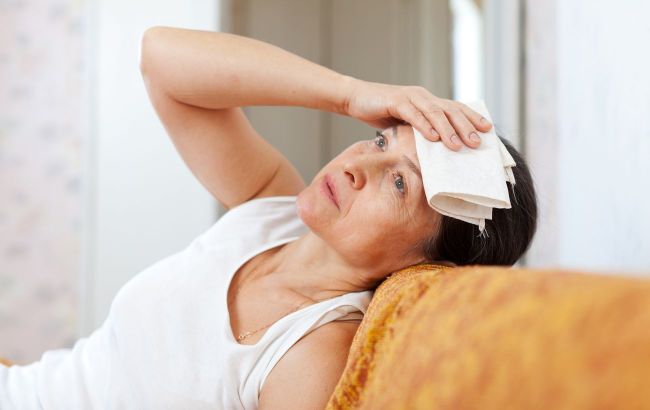Dealing with night sweats: Causes and effective solutions
 Illustrative photo (Photo: Freepik)
Illustrative photo (Photo: Freepik)
Night sweats refers to frequent episodes of excessive or intense sweating during the night. Sweating is a normal part of the body's cooling system, helping regulate temperature and dissipate heat. We sweat in hot weather, in warm indoor environments, during workouts and runs, but regularly waking up in the middle of the night drenched in sweat is not entirely normal.
Why increased night sweating occurs and what should be done about it is explained by RBC-Ukraine.
Why do night sweats occur
According to experts, the conditions and factors that can cause night sweats can vary, but the body's response is typically the same - it attempts to regulate its internal temperature.
There are completely harmless reasons: the room temperature (being too high) or a change in lifestyle (more physical activity). There are also physiological reasons: menopause, infections, illnesses, or medication use.
The hypothalamus, located in the brain, is a part of the endocrine system and the center for regulating body temperature. It contains temperature sensors that receive information from nerve cells (thermoreceptors) located in organs and on the skin.
Thermoreceptors track changes in body temperature, sending signals to the hypothalamus. These signals activate sweating to cool the body or shivering to warm it.
Night sweats are a problem that can affect anyone. In women, such a manifestation occurs more often than in men, mainly due to hormonal changes (such as during menopause).
Hormones
Approximately 80% of women experience hot flashes or night sweats after menopause or during perimenopause. It's worth noting that hot flashes and associated night sweats may not be limited to nighttime.
Overall, during periods of increased sweating, there is a change in estrogen levels, which affects the levels of norepinephrine and serotonin, two neurotransmitters that influence temperature regulation in the hypothalamus.
Hormones also affect night sweats in men, especially when testosterone levels are low, a condition known as hypogonadism. About 38% of men aged 45 and older have low testosterone levels. However, this phenomenon can also occur in men at any age.
Infections, diseases, and medications
When fighting an infection, body temperature often rises, which stimulates sweating to cool and lower the temperature.
Therefore, minor infections, colds, as well as the human immunodeficiency virus (HIV), Hodgkin's lymphoma, and non-Hodgkin's lymphoma can be causes of night sweats. However, during an illness, night sweats are usually not the only symptom.
Medications
There is a range of medications that can cause night sweats. These drugs affect parts of the brain and neurotransmitters that control and stimulate sweating.
Regular alcohol consumption (alcohol dependence) and recreational drugs can also increase the risk of frequent night sweats.
Stress and intense physical activity
People with high levels of anxiety experience night sweats significantly more often than others. Psychological stress activates the body's fight-or-flight response, releasing neurotransmitters that increase heart rate, respiration, and blood pressure. This causes the body to heat up, leading to sweating to cool it down.
Anxiety also increases nighttime sweating, leading to less sleep and increased anxiety.
Experts recommend that, in cases of high anxiety and sweating following anxiety, you should get up and engage in relaxing activities in a dark or dimly lit room.
Apnea
Night sweats are often associated with sleep disturbances, such as apnea, where the airways are repeatedly blocked, leading to loud snoring.
Around a third of people with apnea regularly experience intense sweating during sleep. The exact causes are unknown, but scientists suspect that it is related to low blood oxygen levels.
Exercise
People may experience night sweats after high-intensity workouts. Vigorous exercises begin to stimulate the thyroid gland, increasing the body's metabolism and temperature for up to 14 hours after exercising.
As a result, night sweats can occur even after morning or daytime workouts. Typically, this response indicates an energy deficit or overtraining.
If your body doesn't have enough calories to increase workout intensity, blood sugar levels can drop, leading to hypoglycemia, which can cause night sweats.
What to do for night sweats
If your night sweats are regular, causing concern, disrupting sleep, or accompanied by weight loss (unrelated to diet or lifestyle changes), consult a doctor to determine the cause.
You may need to replace certain medications, undergo additional examinations and tests, change your lifestyle, or, conversely, start taking certain medications.
The following methods can also help you:
- Sleep in a cool room and use a fan if necessary
- Wear breathable pajamas made of cotton or linen
- Choose lightweight bedding and avoid synthetic fibers or flannel
- Consider a cooling mattress or pillow and avoid foam bedding that restricts airflow
- Before bedtime, avoid spicy food, caffeine, and alcohol.

